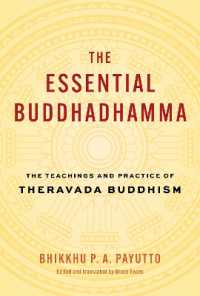- ホーム
- > 洋書
- > 英文書
- > Psychology
Full Description
Human development doesn amp rsquo t occur in a vacuum. Rather, it is deeply rooted in, and affected by, culture.
This textbook examines how culture affects several domains of development, including cognition, emotion, sociolinguistics, peer relationships, family relationships, and more.
The chapters highlight differences between amp ldquo WEIRD amp rdquo cultures (Western, educated, and from industrialized, rich, and democratic countries) and non-WEIRD cultures, as well as differences with respect to gender, race/ethnicity, socioeconomic status, and other identity markers.
Each chapter draws upon a large research base and highlights specific studies to engage students, illustrate key points, and convey the role of empirical research in psychology. As a result, students will learn that the development of behavior, values, social relationships, ways of seeing the world, language, and thought processes cannot be understood separate from culture.
Contents
Preface: A Note to Instructors
Chapter . Development and Culture: Theoretical Perspectives
Chapter 2. Methods for Studying Development and Culture
Chapter 3. Culture and Cognitive Development
Chapter 4. Sociolinguistics
Chapter 5. Culture and Emotional Development
Chapter . Culture, Child Development, and Family Relationships
Chapter 7. Culture and Peer Relationships
Chapter 8. Culture and Conflict Management During Childhood and Adolescence
Chapter 9. Development in Cultural Communities and Physical Spaces
Chapter . Culture and Time Use: Play, Work, School, and Leisure
Chapter . Culture and Academic Achievement
Chapter 2. Culture and Internalizing Symptomology: Shyness, Social Withdrawal, and Depression
Chapter 3. Culture and the Development of Aggression, Delinquency, and Substance Use
Chapter 4. Prosocial Behavior, Morality, and Positive Youth Development in Cultural Context
Chapter 5. Culture and the Transition to Adulthood
References
Appendix: Resources for Further Research
amp emsp








